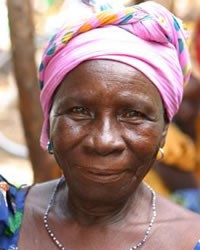Siamou, Seme in Burkina Faso

Photo Source:
Copyrighted © 2026
GoWestAfrica All rights reserved. Used with permission |
Send Joshua Project a map of this people group.
|
| People Name: | Siamou, Seme |
| Country: | Burkina Faso |
| 10/40 Window: | Yes |
| Population: | 28,000 |
| World Population: | 68,000 |
| Primary Language: | Siamou |
| Primary Religion: | Ethnic Religions |
| Christian Adherents: | 6.00 % |
| Evangelicals: | 1.00 % |
| Scripture: | Portions |
| Ministry Resources: | No |
| Jesus Film: | No |
| Audio Recordings: | Yes |
| People Cluster: | Kru |
| Affinity Bloc: | Sub-Saharan Peoples |
| Progress Level: |
|
Introduction / History
The Siamou (also known as Seme) live in Kenedougou Province in western Burkina Faso. They are a part of the Kru, who are located primarily in Cote d'Ivoire and Liberia. Their language (also called Siamou) is part of the Kru sub-group of the Niger-Congo language family.
What Are Their Lives Like?
We know little about the specific lifestyle of the Seme but they probably live like the people around them. The Seme are very close neighbors to the Toussian and the Karaboro, sub-groups of the Lobi and Senoufo, respectively. The Seme primarily grow grains such as rice, sorghum, millet and maize. They also grow yams, squash, beans and peppers. They sell some of these crops in local markets, especially beer made from sorghum. They raise cattle, sheep, goats and chickens at each homestead. The men do most of the farm work, but the women help plant and harvest. Women also cultivate garden vegetables, collect forest products, gather firewood, draw water and prepare food and beer.
The Seme live in rectangular, fortress-type compounds. Both genders help in house-building. Structures are high and have thick mud or clay walls and flat roofs. Several compounds compose a settlement, but these are located at a distance from one another to separate one family's farm and herds from others. Larger bush farms are located farther away from the settlements.
Children are cared for by their mothers and are breast-fed until they can walk. At that time, they are considered to have become human and are entitled to a proper burial. From this point, children are cared for by older sisters or relatives, who include them in their play. Girls play house and sometimes help carry water or grind cereals, while boys help herd cattle.
What Are Their Beliefs?
Most Seme follow their traditional, animistic religion (believing that non-human objects have spirits). Approximately one-quarter more have partially adopted Islam, the dominant religion of the area. Much of this conversion has resulted from contact with Muslim Dyula traders.
Seme religion revolves around the worship of both deceased ancestors and the earth. They believe the earth watches over the community and brings fertility to its soil. Likewise, the ancestors watch over the lineage and are involved with household matters. Also, spirits in animals and objects can be "caught," and they erect shrines to them.
In Mali, they have very few Christ followers. In neighboring Burkina Faso, there is a small church among the Seme.
What Are Their Needs?
The Seme have few Christian resources available in their language. Nevertheless, several have become Christians. They need to be discipled so they can live in obedience to God's word.
Prayer Points
Pray for the Seme people to cultivate a deep spiritual hunger that compels them to seek and embrace Jesus Christ.
Ask the Lord to use African Christians to minister the love of Jesus to the Seme.
Ask the Holy Spirit to anoint the efforts of anyone trying to teach them God's word and those who are discipling Seme Christian believers.
Pray that God will give the Seme believers boldness to disciple others.